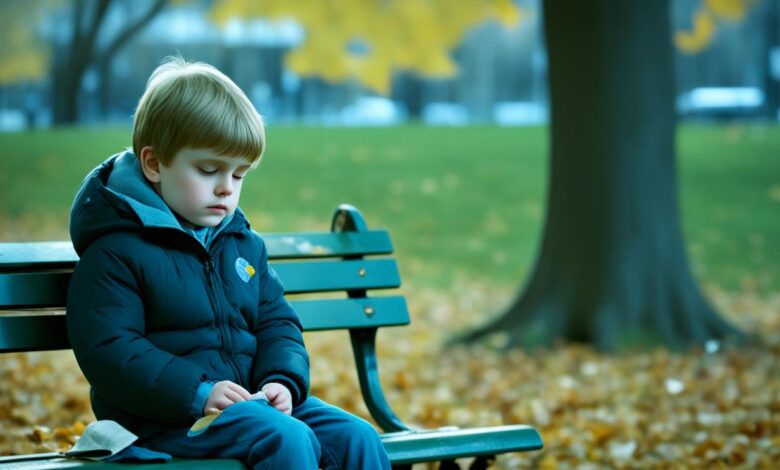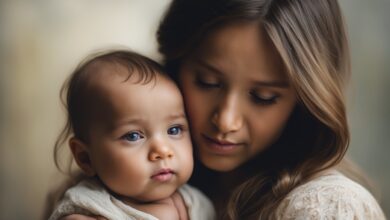
Have you ever wondered how to support your child when they lose someone close? It’s a tough journey, but you’re not alone. We’ll cover how to help your child deal with grief in this guide. We’ll talk about understanding their grief and giving them the tools to heal.
Key Takeaways
- Children grieve in their own way, with different feelings and ways to cope.
- Talking openly with your child is key, letting them share their feelings safely.
- Keeping routines and creating special rituals can help honor the memory of the loved one.
- If your child is finding it hard to cope, getting professional help is important.
- The grieving process changes, and your child might need different support at different times.
Understanding Children’s Grief
Seeing a child grieve can be very sad. It’s important to know that children’s grief is different from how adults handle loss. Young kids know about death but experiencing it can be confusing and hard for them.
Children Grieve Differently from Adults
Adults often show grief through sadness or pulling away. But how children grieve can be unpredictable. They might cry one minute and play the next. It’s normal for them to feel sad, guilty, anxious, or angry.
Very young kids might even act like they did before, like wetting the bed or talking like a baby again.
Stages of Grief in Children
The stages of grief in children are similar to those in adults, but they can happen in a different order and intensity. Kids might go through denial, anger, bargaining, depression, and acceptance in a way that’s not linear. They might go back to earlier stages as they work through their feelings.
It’s important to create a safe, supportive space for them as they deal with differences between child and adult grief.
Understanding how children’s grief shows up helps parents support their kids during tough times. It also helps kids learn how to cope with their feelings in the future.
“Grief is not a disorder, a disease or a sign of weakness. It is an emotional, physical and spiritual necessity, the price you pay for love. The only cure for grief is to grieve.” – Earl Grollman
Breaking the News
When a loved one dies, telling a child can be hard. It’s important to be careful and understanding. The best person to tell the child is usually someone close to them, like a parent or grandparent.
Who Should Tell the Child?
The person telling the news should be very close to the child. This could be a parent, grandparent, or another trusted adult. They need to be able to keep their emotions in check, even if they’re sad. Showing too much grief might scare the child.
What to Say and How to Say It
When telling a child about death, it’s key to speak clearly and honestly. Don’t use words like “passed away” or “lost” because kids take things too literally. Instead, say something like “Grandma died” or “Uncle John is gone.”
Let the child ask questions and answer them truthfully. They might feel many emotions, like confusion or sadness. It’s important to let them know it’s okay to feel these feelings and be there for them.
“The way we break the news of loss to a child can have a big effect on how they deal with grief. Being honest, understanding, and patient is crucial.”
The main goal is to help the child understand and start to process their loss. By being careful and sensitive, you can help them start their journey of grieving.
Helping Your Child Express Emotions
Grief can be tough for kids, but it’s key to let them show their feelings. Parents can make a safe space for their kids to grieve in a good way.
Encouraging Open Communication
Talking openly is a great way to help kids with grief. Encourage your child to share their feelings, whether it’s through talking, writing, or drawing. Reading books about loss can also start important talks and make them feel understood.
Creative Outlets for Grief Expression
For kids who find it hard to say how they feel, creative activities can really help. Activities like creating a memory box, making a grief collage, or writing a letter to the deceased can all be effective ways for kids to process their grief. These activities help kids express feelings and keep memories alive.
Remember, every child grieves in their own way. It’s key to be patient and open-minded as they go through this tough time. By helping children express grief, encouraging kids to communicate feelings, and offering creative ways for kids to grieve, parents can support their child’s emotional health during hard times.
“Grief is not a disorder, a disease or a sign of weakness. It is an emotional, physical and spiritual necessity, the price you pay for love. The only cure for grief is to grieve.” – Earl Grollman
Maintaining Routines and Creating Memories
After losing someone close, it’s key to help your child keep up with their daily routines. The grieving process can be tough, but kids find comfort in knowing what to expect. If you need time to yourself, ask family or friends to help keep things normal for your child.
Even though losing someone special is hard, it’s vital for your child to know life moves forward. Helping them cope with this change is important. Sharing stories, looking at photos, or doing activities the person enjoyed can help. These actions honor their memory and keep their spirit alive.
| Maintaining Routines | Creating Memories |
|---|---|
|
|
Keeping routines and making special memories can help your child deal with their grief. These steps bring stability and connection during tough times. They show that even with big changes, life can still be meaningful.
“Grief is a journey, not a destination. By embracing the memories of our loved ones, we can find solace and strength in the face of loss.”
Coping with Specific Types of Loss
Dealing with the loss of a loved one is tough, especially for kids. Each child grieves in their own way, but there are some common things to consider when facing certain losses.
Dealing with the Death of a Pet
When a family pet dies, it can hit kids hard. It might be their first time feeling the sting of loss. Talk to your child about what happened, and let them know it’s okay to feel sad, mad, or confused.
Encourage them to talk about the good times with their pet. Finding ways to remember and honor the pet can help them feel better.
Supporting a Child After the Death of a Grandparent
When a grandparent dies, it’s often a child’s first time dealing with human loss. Tell them that most people live a long life, and it’s part of life’s cycle. Let them share stories and memories of their grandparent.
Helping a Child Cope with the Loss of a Parent
When a parent dies, it’s a huge blow for a child. Pick a good time to tell them, when you can manage your feelings. Explain it in a way they can understand, and tell them they’re still loved and cared for.
Give them a safe space to talk about their feelings. Be ready to offer extra support and comfort during this hard time.
It’s key to accept your child’s feelings, encourage talking, and help them remember and express their grief. With patience, understanding, and support, your child can get through this tough time and find comfort in their memories of the loved one.
Help Your Child, Loss of a Loved One
When a child loses someone close, it’s a tough time. As parents, we can support and guide them. We can create a safe space for them to feel and deal with their feelings.
Kids grieve in their own way, unlike adults. They might seem okay one minute and upset the next. It’s key to understand these changes are normal for them.
- Let your child talk about their feelings, using words, drawings, or other ways.
- Keep daily routines the same for comfort and stability.
- Plan activities to remember the loved one, like making a memory box or visiting a special spot.
Every child grieves differently, and their needs change over time. With patience and care, we can help them deal with loss in a good way.
“Grief is the price we pay for love.”
– Queen Elizabeth II

Getting help from a grief counselor or therapist can be good for kids who are really struggling. They offer special advice and ways to cope. Watch for signs your child might need more support, like big changes in behavior or ongoing sadness.
Supporting your child in their grief helps them grow strong and emotionally resilient. With empathy, patience, and the right help, you can guide them towards healing and growth, even when times are hard.
Seeking Professional Support
When a child loses someone close, it’s key to watch how they grieve and get help if they need it. Kids often find their own ways to deal with grief. But sometimes, the pain is too much, and they need more support. Professional grief support for children can really help.
Signs a Child Needs Additional Help
As a parent or caregiver, watch for signs your child might need help from a therapist. Look out for these signs:
- Persistent feelings of sadness, anger, or guilt that last longer than expected
- Difficulty sleeping or experiencing nightmares
- Significant changes in appetite or weight
- Withdrawal from friends, family, or activities they once enjoyed
- Difficulty concentrating or a sudden drop in academic performance
- Engaging in risky or self-destructive behaviors
If your child seems really upset and can’t handle grief well, they might have adjustment disorder. This is a serious condition that some kids get after a tough event. It’s smart to talk to a doctor if you think your child isn’t getting over a loss in a healthy way.
“Therapy provides another outlet for talking when a child may feel like they can’t talk with other family members because they are grieving as well.”
Getting professional grief support for children is a great idea. It gives them a safe place to share feelings and learn how to cope. Deciding when to get therapy for a grieving child should be done with help from health experts. They can check what your child needs and suggest the best steps to take.
Conclusion
As we end our journey, the key takeaways are clear. We learn that children grieve in their own special way. We can make a safe space for them to share their feelings without fear.
When a child loses someone close, keeping routines and talking openly can help. If grief gets too hard, getting help from experts can guide them through.
Helping a grieving child is simple: with care, patience, and support, we can help them turn their sadness into strength. We can help them find purpose and build resilience. This will help them get through the hard times.
FAQ
What are the different ways children grieve compared to adults?
Children grieve in unique ways compared to adults. They might switch from crying to playing quickly. It’s normal for them to feel sad, guilty, anxious, or angry. Young kids might even start wetting the bed again or use baby talk.
Who should deliver the sad news to a child?
The person closest to the child should share the news, even if they’re grieving. It’s okay if they’re sad or crying. But they shouldn’t be so overcome that it scares the child more.
What is the best way to communicate the news of a loss to a child?
Choose a thoughtful spot for the talk and use clear language. Let the child guide the conversation, adding more details as they ask. Avoid vague terms like “passed away” as kids take things literally.
How can I help my child express their emotions around the loss?
Letting kids express their feelings is important. Reading books about death together can start conversations. Other ways to help include drawing, making scrapbooks, looking at photos, or telling stories.
How can I help maintain a sense of normalcy for my child after a loss?
Children like routines, so find help if you need time alone. It’s key to grieve but also to show your child that life continues.
How do I support my child through different types of loss?
Loss of a pet can be hard for kids. Losing a grandparent is their first human loss. Losing a parent is very tough for them to understand. Explain death in simple terms and reassure them they’re still loved and cared for.
When should I seek professional help for my grieving child?
If your child can’t handle grief well, they might have adjustment disorder. See a doctor if your child isn’t coping with loss. Therapy can help them talk about their feelings when it’s hard at home.




